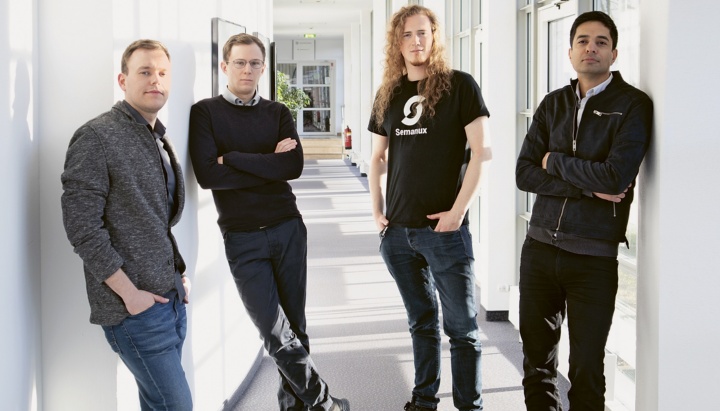Operating digital devices and using the Internet is not always easy, for example, whilst driving, cooking, or because of a physical disability. The founders of the start-up Semanux want everyone to be able to interact with the Internet and computers in a more convenient and flexible manner. Dr. Raphael Menges, Ramin Hedeshy, and Lukas Schmelzeisen of the Analytic Computing Department at the University of Stuttgart's Institute for Parallel and Distributed Systems (IPVS) have been researching this for over eight years.
In January 2021, they and Florian Lerch, a business economist at the Technical University of Munich, submitted their successful application for EXIST research transfer funding under a Federal Ministry for Economic Affairs and Climate Action (BMWK) funding program, which is endowed with over 645,000 euros. This emboldened them to take the next step and they signed a partnership agreement in mid-January thereby converting the spin-off into a standalone limited liability company (GmbH). "Signing the contract", says Menges, "marked a major step forward for us in realizing our vision of improving accessibility to the digital world through our products.”
Enabling effortless operation
Great efforts are already being made towards the social inclusion of disabled people, he said, yet the digital space is still too often neglected. Whilst there are systems available that use gaze, voice, or mouth control to operate the mouse functions, these always use alternative inputs to simulate the mouse and keyboard. “What we are trying to do”, Menges explains, “is to create a deeper level of customization by understanding webpage content. Our goal is to enable the alternative input devices to be directly combined with the ways in which one can interact with a webpage, for example, by entering text or selecting objects.” For example, using the Semanux software and a webcam enables one to operate a computer using only the head. The same can be done in combination with a foot switch, gamepad, facial expressions, or buzzing.
Semanux stands for Semantic User Experience, and refers to the meaning of webpage content, i.e., what the site contains and how it can be used. The researchers then use this knowledge and various input devices to create the user experience. The company’s success in the GKV im:pulse Accelerator challenge in November 2022, when the start-up took first place, shows that Semanux's concept is attracting a great deal of social interest. Thanks to their approach to AI-based interactions, the company was ranked among the top 3 start-ups in the Baden-Württemberg Stiftung's AI Garage Accelerator competition in January 2023.
Comprehensive support at the University of Stuttgart
Mentor Prof. Steffen Staab holds the Chair of Analytic Computing and is co-spokesperson of the University of Stuttgart's Cluster of Excellence SimTech. He is providing support to Semanux on issues ranging from human-computer interactions, and artificial intelligence to innovative business models and entrepreneurship. "We are all subject to physical limitations from time to time, for example when holding a child, driving a car, or cooking dinner," Staab explains: "Our goal is to use Semanux products to include everyone, whether they are temporarily restricted in their movements or permanently disabled." In addition to Staab, the team is also receiving support from Ruben Maier, a lecturer at the Pforzheim University of Applied Sciences and a freelance consultant for product development and organizational structure, who will eventually be joining the team as an advisor.
Entrepreneurship: Startup consultancy at the University of Stuttgart
Thanks to their involvement, the company is benefiting from both scientific and entrepreneurial expertise. The spin-off was enabled thanks to various entrepreneurship support services offered by the University of Stuttgart, such as the Technology Transfer Initiative GmbH (TTI), the Institute of Entrepreneurship and Innovation Science (ENI), and Division 1 – Research and Transfer.



